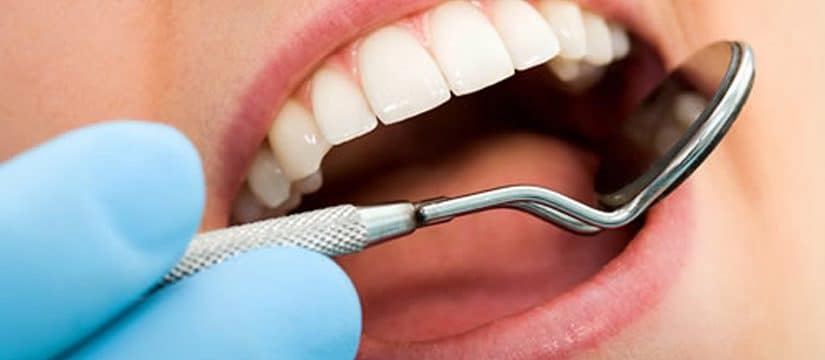
The aim of any dental examination is to check the health of your teeth and gums. It is recommended that you go in for a dental examination at least once every six months in order to ensure that your teeth are healthy.
Not knowing what the examination process involves can sometimes create stress, because people often associate dental visits with painful procedures. In this post, we tell you all about the benefits of dental examination and how it can help you develop and maintain oral health.
What is involved in dental examination?
Medical history:
The first step is to check the medical history of the patient. Information is collected on the following:
- The current medication one is taking – this includes vitamins or any other supplements.
- Habits such as smoking, tobacco chewing, or alcohol consumption.
- Allergies if any.
Thorough examination:
- Surface of every tooth/oral cavity is examined
- If required, X-rays are used for obtaining a clearer picture of the oral cavity.
- Gums are examined.
- Plague and calculus formations are also checked.
Information sharing with the patient:
After the above steps, the dentist will hold a discussion with their client to inform them about the findings of dental examination. If there are any urgent matters of concern, then these are discussed. During the discussion you can expect to hear about whether your fillings need to be replaced, if an infected tooth needs a root canal, or whether you need orthodontics. The dentist will also advise on how to maintain dental health and hygiene.
Why does one need regular dental examination?
Dental health and hygiene is a very vital aspect of the overall health of any individual. Oral health can also be seen as indicative of the health a person enjoys. Benefits from dental examination is manifold, given below are some of the major ones.
1. Detecting Cavities/plaque
Dental examinations can immediately pick up if there is any cavity or plaque that has developed in the oral region. Dentists use various tools and conduct a complete and thorough examination of the mouth.
Even if one follows a very strict dental cleaning process, there are chances of not being able to clean certain parts of the mouth. This can lead to plaque formation and if left by itself this can solidify into tartar. Tartar can be removed only with professional help and it is important to treat it as it can erode the teeth.
Cavities do not usually have visible any symptoms until after they are pretty severe. Hence dental examinations can help to detect them earlier and restore health of the teeth.
2. Detecting inflammation in the mouth/gum disease
Dental examinations will provide you with the general condition of the oral cavity. Dentists can guide you by suggesting if you need scaling to further maintain oral health.
Building up of tartar in the mouth can lead to inflammation or swelling of the gums. They get infected with bacteria and can lead to losing of the teeth.
By regular cleaning of the teeth by procedures such as scaling, oral health can be maintained. This will also help in preventing inflammation of the gums and reduce the chances of gum disease, teeth decay etc.
3. Detecting oral cancer
Cancer in the oral region is a very serious disease that affects people. Statistics show that cancer of the oral cavity and oropharynx is of the most common oral cancers seen worldwide. Studies have shown a high death rate because of oral cancer, this is not because it is hard to diagnose or discovery, but rather due to its late presentation which makes it much harder to treat during later stages.
What this means is that it oral cancer is discovered quite early then there are high chances for the survival for the patient. This can be possible by regular dental examination. Early symptoms of cancer in the oral region are seen as patches appearing in the oral region, ulcers in the mouth etc.
This does not suggest that all ulcers or lesions seen in the mouth are cancerous. But it’s always better to check all symptoms. Sometimes it can happen that we overlook these harmless symptoms which may then lead to further complications.
Dental examinations can help in primary screening and dentists with their expertise can guide you further if need be.
4. Detecting and stopping of bad habits
We are all victims of bad habits – it could be having too much fast food, sweetened drinks, smoking, or consuming alcohol. It is not that people do not know the harmful effects of these – it’s just that they tend to ignore it.
Dental examination can be an eye opener in these cases, because dentists can examine your teeth and give you information on how your habits of smoking or food consumption are affecting your dental health.
You will be surprised to know that simple, seemingly harmless habits like chewing nails or chewing ice can all harm your teeth. Dental examinations reveal all those areas that have been affected because of one’s bad habits.
5. Improving health and saving money
Who would have thought dental examinations can save money, right? Well, it is true. Dental examinations help give you an overall picture of your oral health. This is an indicator of your general health also.
Not only that, it can point to you areas that you need to focus and seek help. Small ulcers that you might think will go away might be an indicative of an inflammation of the mouth which can in turn lead to gum disease.
Dental examinations help you to seek immediate and urgent help into small issues that can develop into serious concerns if one does not go for regular dental examinations.
Visiting dentists every 6 months – that is twice a year is recommended. This can vary depending on your oral concerns or age or lifestyle. But do visit your dentist regularly to maintain the health of your oral cavity.
